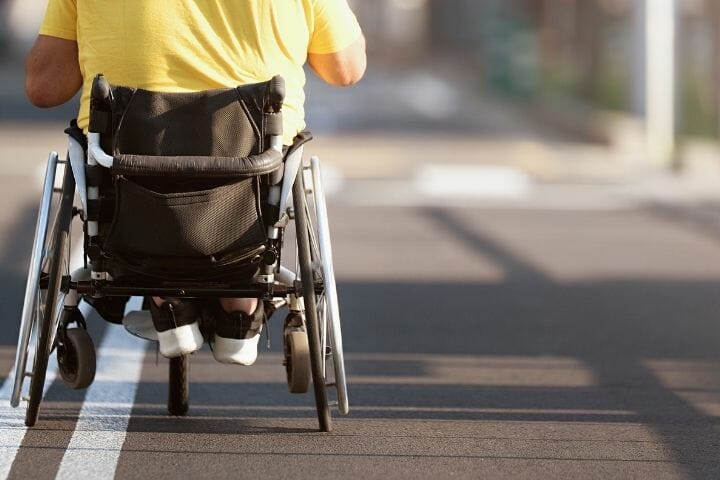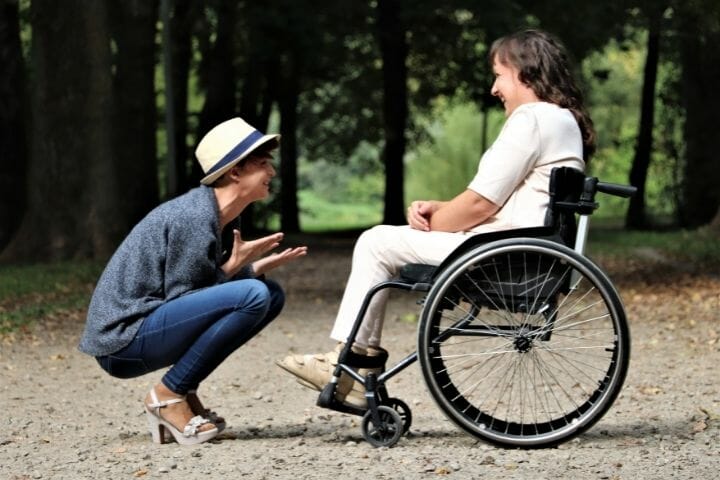Are you disabled and looking to join the office during the Covid-19 epidemic? This article lists ADA Rehabilitation Act And Coronavirus related information in one place for easy reference
Contents
The Equal Employment Opportunity Commission (EEOC) updated its Rehabilitation and Coronavirus guidelines recently. These guideline changes were made to answer the majority of the questions faced by employees when they rejoined their workplaces.
These guidelines also answer the company’s decision to bring the employees back to the office and other workplaces. This publication is a precious resource for employers to review employment decisions.

This article elaborates the ADA Rehabilitation Act and Coronavirus Recommendations, making it easier for employers and employees to understand the rules they need to follow.
The Definition Of Covid Under The ADA
Under the ADA, a person is described with a disability in these three conditions.
- Case 1: This is the case where the patient suffers from an actual physical or mental impairment. These patients are limited to performing certain activities as well—activities such as walking, talking, seeing, learning, hearing, and so on.
- Case 2: In this case, the patient has a record of a disability. The patient must have a special certificate that describes their disability.
- Case 3: The last case is when the individual is perceived with a disability if they have some impairment that restricts their overall living conditions.
The EEOC recently reminded employers and the public at large that these conditions are equally true for Covid-19 related complications.
For example, if a patient with heart disease is perceived to have a higher threat of Covid-19 and therefore requires reasonable accommodation (such as a separate cabin or cubicle for work) to protect themselves from the threat, then the said employer has to ensure these accommodations.
Covid-19 Can Also Be Classified As A Disability Under The ADA
A person with mild symptoms or an asymptomatic patient will not be counted as an actual disability as these symptoms are easy to deal with. You can be fit and healthy in a week. At this stage, Covid-19 is similar to the common flu or cold.

Some people will have Covid-19 related symptoms that may last for several months after the initial infection or else recurring symptoms that can come back after getting well. This can happen to anyone with the virus, sometimes even those who had mild symptoms initially and recovered quickly. This is classified as “long COVID.”
Some of the symptoms of long Covid include:
- Fatigue
- Brain fog (a difficulty to concentrate)
- Headache
- Dizziness
- Respiratory problems, including shortness of breath
- Heart palpitations
- Cough
- Loss of taste or smell
- Joint or muscle pain
- Chest pain
- Depression
- Fever
- Organ damage to heart, kidneys, lungs, brain and skin
Long Covid can be considered as a disability under Section 1557 and Section 504 of the Disability Act. The litmus test here is that the disease should limit the person’s ability to do daily and major activities of life.
Covid-19 is a challenging problem to classify under the ADA, as in the majority of the cases, the patient turns back to being normal and healthy.
Some Examples Will Help You To Understand The Guidelines Better
If the patient has the virus and is suffering from headaches and is also experiencing dizziness along with difficulty while concentrating limits the ability to work. Such individuals are eligible for accommodations.
An individual or a patient who requires oxygen supplements for breathing is a severe symptom of the virus. This condition also comes with a constant feeling of short breathlessness, fatigue, and other effects. Such people can also take months to recover from the virus fully.
Then there is an asymptomatic individual who only has mild symptoms of the virus. They have minor symptoms similar to a common cold or flu. These people may only need a week to recover from the virus.

Risk Factors
The risk factors associated with accommodation for returning employees with disability in the workplace are high.
Inform The Employees in Advance
When the organizations expect the employees to return, it is a better strategy to inform the returning employees. Another good strategy is to also provide the contact information of the returning employees to all the employees working in the workplace.
With the help of this information, the employee would be able to contact the employer to direct any requests for any changes or flexibility in the workplace.
Take Note of CDC Listed Comorbidities
The employers can send notices or inform the employees about the CDC-listed medical conditions or comorbidities that make certain employees vulnerable to severe forms of Covid-19.
As these employees are returning to the workplace with a disability, they might need some cooperation and help from their colleagues and the employees.
The ADA and rehabilitation act allows employers to distribute the contact information of the employees. Other employees can be informed about the accommodations that these employees will need.
Determining the Type of Accomodation
According to different situations, the employers will have to interact with the employee as soon as possible. They will determine if they need accommodation and if they do, then what type of accommodation will be best for them. Employers may also need some help to select the right form of employment.

Applicability for Accomodation
The guidelines suggest that the employees are not entitled to accommodation if their request is based on family issues or concerns.
You can consider an example if you are an employee and your family members fall in the category of high vulnerability. You will not be provided with the accommodation to protect them. An employee with no disability is not entitled to work remotely (telework).
An employee cannot avail of the accommodation services to protect a disabled family member from exposure to Covid-19. However, it is up to the employer to provide the employees with working flexibility. But the employer doesn’t need to do so. It is wholly based on their wish and understanding.
Age Related Discrimination
According to the guidelines given by the CDC, seniors above the age of 65 are at a higher risk of contracting Covid-19. Moreover, this age demographic also develops most of the severe cases of this disease.
However, as of now, there are no separate rules or protection for those above 65 and still working. Federal employment does not differentiate between the employees based on the risk related to health factors.
A separate act regarding this issue protects the employees from facing discrimination based on their age. The Age Discrimination in Employment Act(ADEA) protects age-related differentiation for people above 40. This also protects them from workforce discrimination at the times of Covid-19 based on their age.
It is in the best interest of the employers to protect and provide accommodation for all the employees. But the employers must understand that they only offer this accommodation to the eligible employees.
Both the employer and employees have the same responsibility to work together and identify the personnel at the highest risk. They must also determine whether these employees have any disability that falls under the ADA.

Reasonable Accommodations
Under the ADA, reasonable accommodations are minor or major adjustments provided by an employer to an employee if they have a disability. It is up to the will of an employer to choose these accommodations if they have received multiple applications or requests.
It is the employer’s responsibility to provide the employees with an alternate source of accommodation if the one they asked for is not available. Employers also take some vital steps to reduce your exposure to the virus.
The Department of labor in the U.S. is working very hard to protect the health and safety of the working population in America. They want to provide essential resources to help employees and other workers to prepare people for Covid-19.
- There is a separate coronavirus website. This website will provide you with essential health information, remedies, and so on.
- Right now, every employee is interested in working from home. They want to be safe with their families and work remotely. But this is not the easy thing to do always, especially for the work that requires the employees to be present onsite. The employees are also put at a higher risk of contracting the virus for such work. This is the reason why the government introduces special accommodations for these employees.
- Some of these accommodations include creating proper barriers for these workers, cleaning and sanitizing the site every day, ensuring that the staff maintains the recommended distance between themselves. Employers can also go for some major temporary changes, such as changing the job profiles to fit the organization’s needs. They can also provide employees with disabilities special certificates or exemptions from work as they are more vulnerable to the virus.

- Interaction with the employees is a crucial step in providing accommodations. The employers must be in constant communication with the employees to understand why the employees have requested an accommodation. This could be because of any preexisting condition, any illness aggregated by the pandemic, family issues, and so on. As an employer, you can also ask for the employee’s medical certificates to ensure that their request is genuine.
- The employees can also answer some questions, such as why their disability is proving to be a limitation for them at work if they are granted the accommodation. It will help them maintain their existing levels of performance.
- You can also ask the employees how the allowed accommodation will address their limitations. You can also try to know whether another form of accommodation will suffice their needs or not.
How To Explore These Reasonable Accommodations?
An employee is guaranteed reasonable accommodations under the ADA when their disability requires them to ask for it. Employers can reject a request for reasonable accommodation based on undue hardships.
But then the employers will have to show the expenses of these accommodations according to the EEOC. There are some things that an employer should consider before granting an accommodation:-
- What is the type of accommodation asked for?
- How much money will be spent to fulfill these accommodations?
- The organization’s finances include all the employees, their expenses, and resources.
- Available money and resources with the employer.
- They should also consider the impact of these accommodations on the employees.

People Already Suffering From A Condition Can Also Be Protected
If the patient already suffers from some impairment. If this condition worsens because of the virus, it can be considered a disability under the ADA.
Some of the examples to showcase the above problem are:-
- If a patient is suffering from Covid-19 develops some inflammation in the heart. Then this person will be considered disabled under the ADA.
- If the patient also suffers from a stroke after suffering from the virus.
- In some instances, some people might also develop diabetes related to the virus. Then these people are also eligible for the accommodation.
- There are some cases where the virus has harmed the existing heart conditions of the people and worsened them.
Wrap Up
The American government has issued guidelines on how firms and organizations should proceed with employment and accommodation in this pandemic. People who have some disability and a physical or mental disability will fall under the protection of ADA.
The employees don’t always need to establish that they have some disability and qualify for the accommodations under the ADA. It is up to the employer to take the necessary steps to investigate and check these claims.
In the end, we hope that the information given above proves to be helpful for you. If you know any person for whom this piece of information can be helpful, then do share it with them. If you have some more suggestions or any comments, you can write to us directly.
